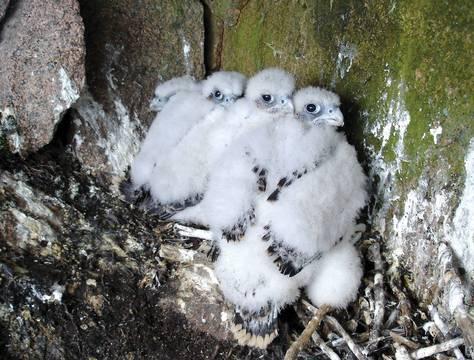It's that time of year again -- the peregrine falcons are the Precipice Cliff in Acadia National Park. And while that means you can't head up the Precipice Trail, you can get a good look at these raptors that once were thought on the way to extinction.
Acadia Superintendent Sheridan Steel says the falcons are again defending a nesting territory on the cliff. Volunteers and staff have observed these adults engaging in courtship and pre-nesting behavior signaling these birds’, which are identified as a Maine Endangered Species, intentions to nest and raise the chicks through the middle of the summer.
To protect the nesting birds from inadvertent disturbance or harassment, areas in and around the Precipice Cliff are closed to all visitor and operational activities. The closure at the Precipice includes the popular Precipice Trail on the east face of Champlain Mountain.
The equally popular East Face Trail has been closed due to a rock slide caused by an earthquake in the fall of 2006 and remains closed because of a concern for safety on this trail.
This notice identifies the closing of the Precipice trail and reinforces the closure for the East Face Trail as well as applies to the closure of the surrounding cliff face area. The trails are clearly marked with signs that identify the reason for the closure, the dates, and a map that delineates the area of the closure.
The Precipice Trail will remain closed until approximately five weeks after chicks take their first flights, or fledge, from their nests, which is usually in late July or early August. Additional notices about the closures will be posted at all appropriate parking areas, trail heads and junctions with more detailed information available at park visitor contact stations or centers at park headquarters.
If the park biologist determines that the nesting attempt has failed later this spring or early in the summer, the park’s management team will consider the new information along with information about needed maintenance work, and make a determination about an appropriate time to rescind the closure order and open the trail and surrounding area. The East Face Trail will remain closed for safety-related concerns.
Park staff and volunteers have been observing other cliffs in the park in hopes of documenting other falcon nesting behavior or activity. To date they have either not seen adult falcons or a pair engaged in territorial defense or breeding behavior. If pairs of falcons are observed and found to be engaging in pre-nesting or courtship activities, the park will likely identify closures for these areas as well.
Research has shown that nesting falcons are particularly vulnerable to human disturbance originating immediately above the nesting area or directed at the nest site. Continued disturbances can lead to chick mortality or complete nest failure, which further slows the recovery of the species in Maine.
In 1991, the first pair of peregrine falcons nested successfully on the east face of Champlain Mountain. A second pair of falcons established a nest site on Beech Cliffs above Echo Lake in 1995, and a third pair of falcons established a nesting territory at Jordan Cliffs in 1996. Mount Desert Island's falcon pairs have become the foundation of Maine's peregrine falcon recovery program with the fledging of more than eighty chicks over the last 17 years.
The peregrine falcon was placed on the endangered species list in the early 1970s because pesticides such as DDT coupled with habitat loss and other human disturbances had caused the peregrine population to decline throughout North America and disappear in the northeastern United States before the 1960s.
The federal listing protected the remaining birds and their nesting cliff sites in addition to initiating an international captive breeding and reintroduction program. Acadia National Park was selected to be one of the reintroduction field sites in Maine and for the Northeast.
The reintroduction program began in 1984 using a method known as hacking. This method places and rears young captive-bred peregrines on suitable cliffs in hope that the cliff and area is “imprinted” upon the young birds and that they return to the area as adults and establish a breeding population.
Jordan Cliff on Penobscot Mountain overlooking Jordan Pond was selected as the hack site and served in this role for three springs beginning in 1984. In 1999, the peregrine falcon was removed from the list of species receiving federal protection under the Federal Endangered Species Act.
At that time populations in most recovery regions of the United States had attained or surpassed most of the objectives identified in Regional Recovery Plans developed by states in concert with the U.S. Fish and Wildlife Service. Recovered populations are being monitored through a national delisted species monitoring program begun in 2001, which will be continued until 2015 to ensure that recovered populations remain stable or increase.
The park will announce the reopening of the closed areas and trail when the park biologist and the state endangered species biologist determine that human activities will not disturb the young birds.


 Support Essential Coverage of Essential Places
Support Essential Coverage of Essential Places






